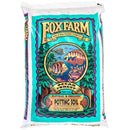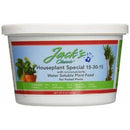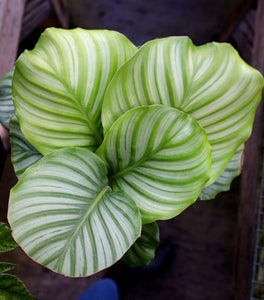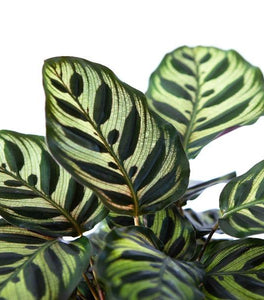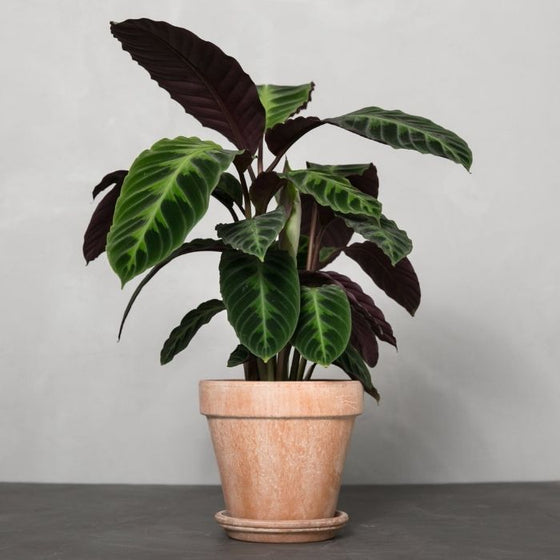
Images Depicted Range in Maturity & Container Size
Pots & Decorations Not Included Unless Otherwise Stated
Jungle Velvet Calathea: Deep Green Velvet with Wine-Red Undersides
Luxurious, Velvety Foliage with Jungle Drama
Calathea warscewiczii, often referred to as Jungle Velvet Calathea, is all about texture and depth. Its long, lance-shaped leaves feel softly velvety to the touch and are painted in deep forest green with lighter feathered patterning along the midrib, while the undersides glow a rich burgundy or wine-red. As a member of the prayer plant family, the foliage gently lifts and lowers in response to light, adding a subtle sense of movement and life to your plant corner. It’s the kind of plant that instantly makes a space feel more intentional, tropical, and refined.
Upright, Full, and Perfect for Floor or Stand
In its native Central American forests, Calathea warscewiczii grows as a low, herbaceous understory plant, forming upright clumps of foliage. Indoors, you can expect a mature plant to reach about 2–3 feet tall and 1–3 feet wide in a roomy pot, creating a lush, fountain-like silhouette of overlapping leaves. New shoots emerge from the base, gradually filling in the plant and giving it a dense, jungle-like appearance without becoming overwhelmingly tall. The combination of height, spread, and velvety texture makes Jungle Velvet Calathea a perfect candidate for a decorative floor pot or plant stand where it can be admired up close.
Bright Indirect Light, Moist Mix, and High Humidity
Jungle Velvet Calathea thrives in medium to bright indirect light that mimics the dappled shade of the forest floor. Place it near an east or north window, or a few feet back from a brighter window with sheer curtains—strong enough to keep colors rich, but never harsh, direct sun that can scorch leaves or fade the pattern. Plant it in a rich, well-draining potting mix with organic matter and add perlite or fine bark to ensure the roots stay evenly moist but never waterlogged. Water when the top 1–2 inches of soil feel dry, then water thoroughly and let the excess drain. Consistency is key, as this plant dislikes both bone-dry soil and constantly soggy conditions.
Humidity and warmth are where this plant really shines. Aim for indoor temperatures around 65–80°F and relative humidity above 50%, ideally closer to 60% or more, to keep the velvety leaves free of crispy edges. Bathrooms with good natural light, kitchens, or grouped plant displays are excellent locations. The Jungle Velvet Calathea is also sensitive to hard or heavily treated tap water; therefore, using filtered, distilled, or rainwater can help prevent leaf-edge browning and keep the foliage looking its best.
Pet-Safe, High-Impact Focal Plant Indoors
Think of Calathea warscewiczii as a living piece of velvet artwork for your interior landscape. Indoors, it works beautifully as a statement plant in living rooms, bedrooms, and home offices, where its deep tones and soft texture add drama without harshness. Group it with upright palms or fiddle-leaf figs for height and contrast, or pair it with trailing vines and ferns to create a lush, layered plant corner.
One of its most significant advantages: like other Calatheas, Jungle Velvet is considered non-toxic to cats and dogs, making it a smart choice for pet-friendly homes that still want bold foliage. In warm, frost-free climates it can summer outdoors in a shaded, humid spot, then move back indoors once temperatures begin to dip, giving you flexible styling options throughout the year.
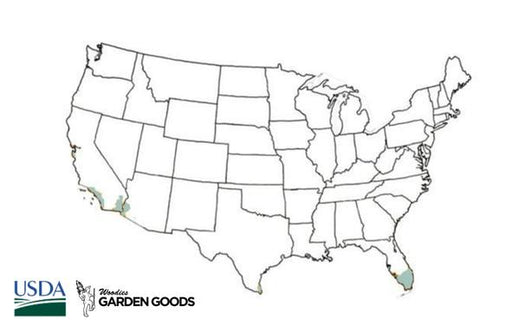
| Hardiness Zone: | Best as an indoor plant; outdoors year-round only in frost-free Zones 10–12 |
|---|---|
| Mature Height: | Typically 2–3 ft tall |
| Mature Width: | 1–3 ft wide indoors |
| Classification: | Tropical foliage houseplant |
| Sunlight: | Medium to bright indirect light; avoid direct sun |
| Flower Color: | Occasional white to cream flower spikes; primarily grown for foliage |
| Soil Condition: | Rich, well-draining, moisture-retentive mix with organic matter and perlite/bark |
| Water Requirements: | Keep evenly moist; water when top 1–2" are dry; prefers filtered or soft water |
| Uses: | Pet-friendly indoor focal plant, tropical accent for living rooms, bedrooms, and plant corners |
How to Care for Calathea warscewiczii
Please follow our planting and care instructions to keep your Jungle Velvet Calathea happy and healthy for years to come

How should I plant Calathea warscewiczii (Jungle Velvet Calathea)?
Choose a container with drainage holes that’s only 1–3 inches wider than the current nursery pot—Jungle Velvet prefers to feel comfortably snug rather than lost in a big volume of wet soil. Fill the bottom with a rich, well-draining mix based on quality indoor potting soil, amended with perlite and fine bark or coco coir to keep it airy and moisture-retentive at the same time. Gently remove the plant from its grower pot, loosen any circling roots, and set the root ball so the top sits level with or just slightly above the surrounding mix. Backfill around the roots, lightly firming to remove air pockets without compacting the soil. Water thoroughly after planting until moisture flows from the drainage holes, then allow the pot to drain completely before returning it to its saucer or decorative cachepot. Position your Jungle Velvet Calathea in medium to bright indirect light—near an east or north window, or set back from a brighter window with a sheer curtain for protection. Keep it away from cold drafts, heating vents, or spots where intense midday sun could land directly on the leaves, as this can cause fading and scorching.
How often should I water Calathea warscewiczii after planting?
After planting, that first deep watering helps settle the soil around the roots. From then on, aim for consistently moist—but never soggy—conditions. Let the top 1–2 inches of the mix dry slightly between waterings, then water evenly until excess drains from the bottom of the pot. In average indoor conditions, that often means watering roughly once a week during spring and summer, with adjustments based on your home’s light, temperature, pot size, and humidity. Because Calatheas can be sensitive to water quality, using filtered, distilled, or rainwater can greatly reduce the risk of crisped leaf edges and mysterious browning, especially in areas with hard or heavily treated tap water. In winter or in lower light, the soil will dry more slowly, so stretch out your watering intervals and always check the mix before you water again. Drooping, limp leaves and very dry soil suggest it’s time for a drink, while persistent yellowing from the base and a constantly wet pot point to overwatering and the need to let the mix dry further before the next soak.
When should I fertilize Calathea warscewiczii?
Fertilize Jungle Velvet Calathea lightly during the active growing season, usually from spring through early fall. A balanced, water-soluble houseplant fertilizer diluted to half strength every 4–6 weeks provides plenty of nutrients to support healthy leaf growth and color. Always apply fertilizer to moist soil—never bone-dry—to reduce the risk of root burn and salt buildup in the potting mix. If you prefer a gentler, organic approach, top-dress the soil with a thin layer of worm castings in spring and supplement with a diluted organic liquid fertilizer once a month. Avoid heavy, frequent feeding, as Calatheas are more prone to suffering from overfertilization than from being slightly underfed. Pause fertilizing in late fall and winter when growth naturally slows, then resume again in spring when you start to see fresh new leaves unfurling regularly.

When and how should I prune Calathea warscewiczii?
Calathea warscewiczii doesn’t require structural pruning, but routine grooming keeps it looking lush and refined. Use clean, sharp scissors to remove any yellowed, crispy, or damaged leaves at their base as soon as you notice them, which encourages the plant to direct its energy toward healthy new growth. If a leaf is mostly healthy but has brown tips or edges, you can carefully trim away only the damaged parts, following the natural curve of the leaf so the cut blends in. The best time for more noticeable cleanup is during the growing season, when the plant replaces foliage more quickly. You can also gently wipe the velvety leaves with a soft, slightly damp cloth to remove dust—avoid leaf shine products, which can clog pores and diminish the natural texture. Allow good air circulation around the plant to prevent fungal issues, but keep it away from harsh drafts that could stress the foliage.



